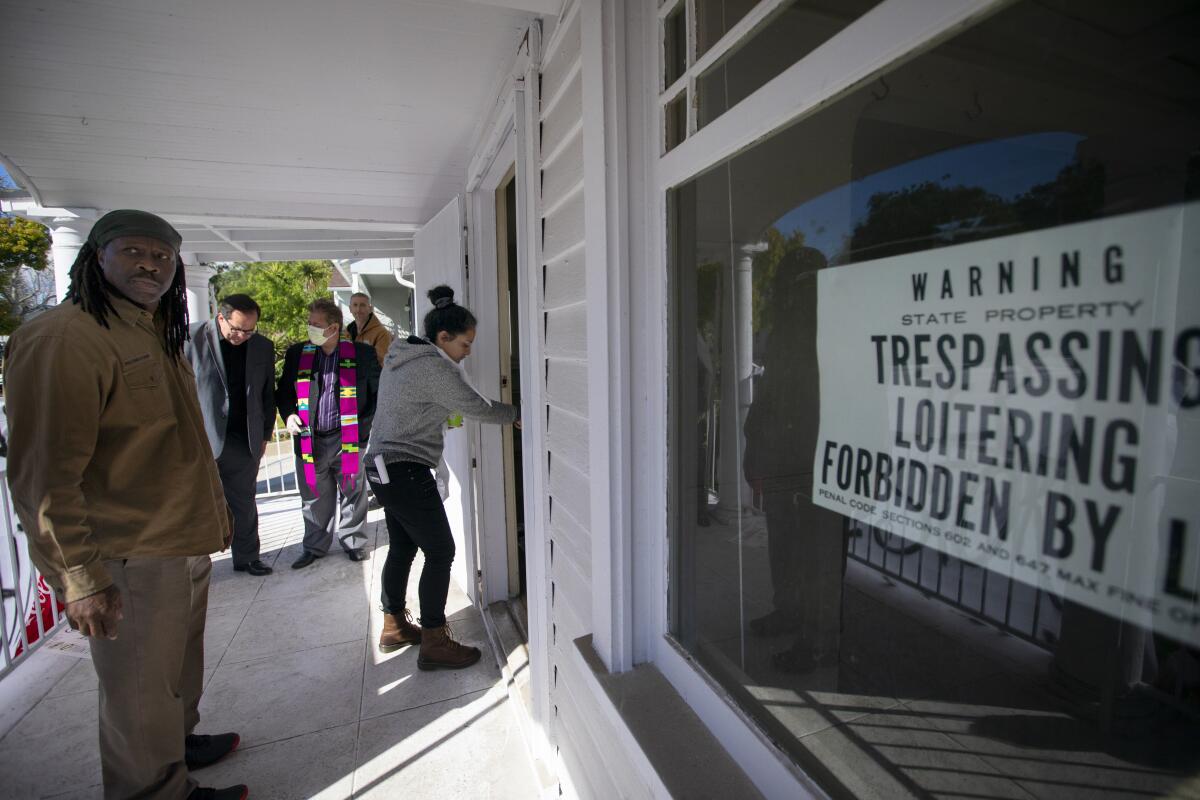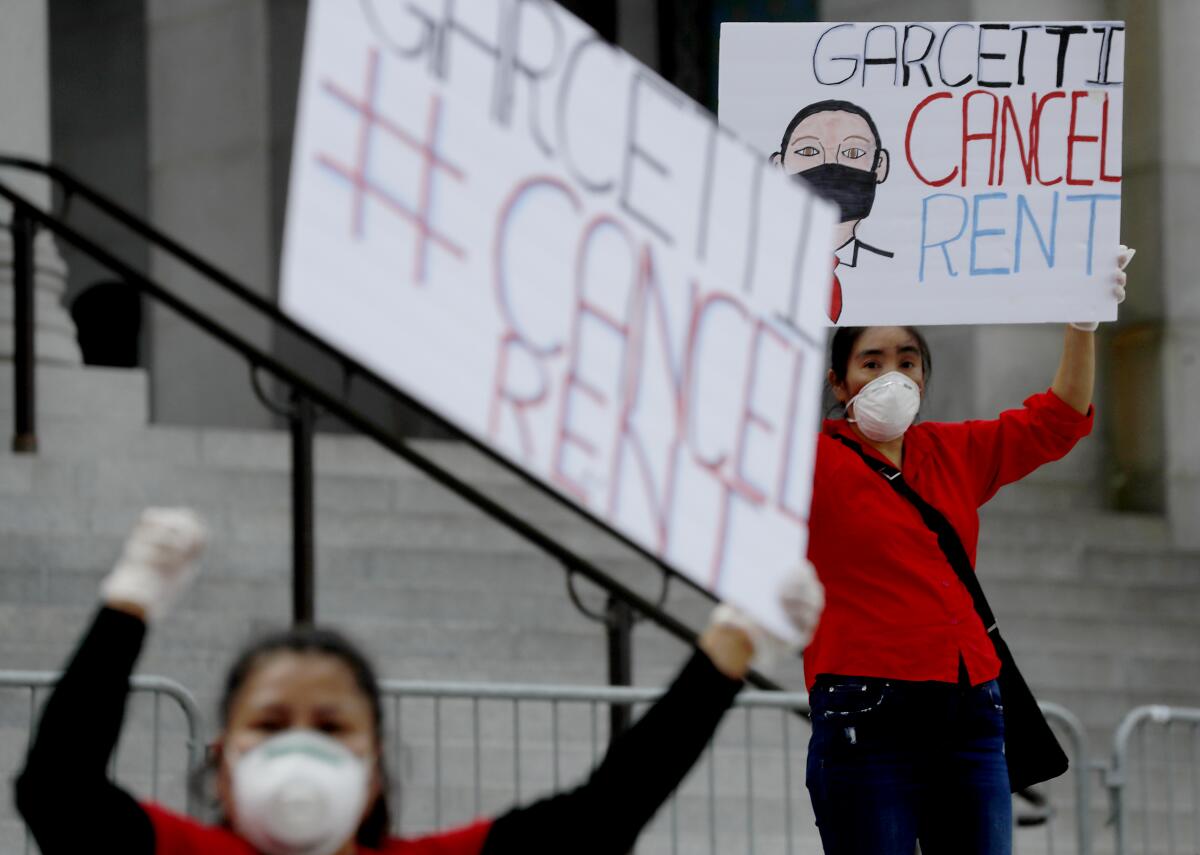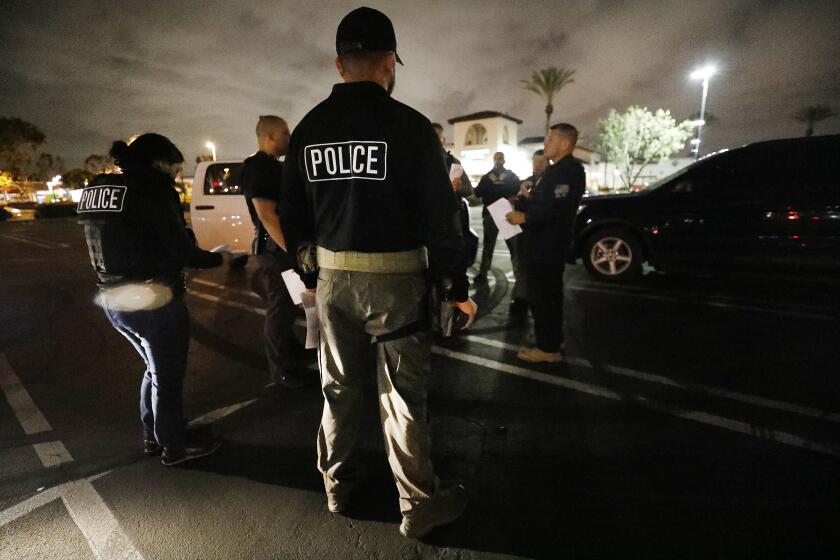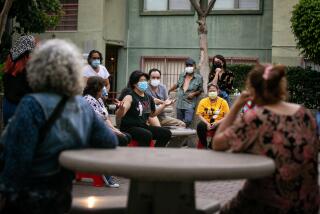‘This isn’t an acceptable reality’: L.A. renters hit new levels of rage under coronavirus

With L.A. under a stay-at-home order to prevent more coronavirus cases, tenants are turning their personal economic situations into mass protests.
Chris Tyler lost his job at a restaurant on March 15 — the same day Mayor Eric Garcetti banned sit-down food service to slow the spread of the novel coronavirus in Los Angeles. A couple of weeks later, he and his partner decided not to pay rent for the one-bedroom apartment they share in Silver Lake.
“It’s a decision that I have made personally that is both political and very much out of necessity,” said Tyler, 31. “I don’t think it’s an unreasonable choice to make in the middle of a global pandemic.”
As California enters its second full month under stay-at-home orders designed to prevent more coronavirus cases, a growing number of tenants are turning their personal economic situations into mass protests, demanding that legislators at all levels of government pass laws to cancel rent until the public health crisis is over.
They call it a “rent strike” and it is just one tactic marking a dramatic new escalation in the long-running fight over affordable housing in California.
Even before the pandemic, more than 9 million tenants — more than half of those in the state — were burdened by high rents, spending more than 30% of their incomes on housing. But now, with many businesses shut down and unemployment rolls exploding, the coronavirus has injected a new level of fear and desperation into that fight.
In March, just as the pandemic was taking hold in California, more than a dozen families seized vacant, government-owned homes in the El Sereno neighborhood of Los Angeles. The adults and children, some homeless and some housing insecure, contended that they couldn’t follow public health orders to isolate themselves in their homes if they were living in vans and in overcrowded apartments.
“With this health crisis and this housing crisis, we need every vacant house to be a home for those who don’t have a safe and stable place to sleep in,” said Ruby Gordillo, 33, while standing on the porch of a two-bedroom bungalow before moving in with her three children.

Although the coronavirus provided an immediate reason, the families had been planning to take over the houses, emboldened by a similar protest last fall. Moms 4 Housing, a group of homeless black mothers, made headlines when they commandeered an empty home in Oakland as a way to protest rampant real estate speculation in the Bay Area city.
The mothers lived in the home, owned by Redondo Beach-based Wedgewood Inc., for two months. And, following their eviction by heavily armed Alameda County sheriff’s deputies, Gov. Gavin Newsom helped broker an agreement to sell the house and dozens of other Wedgewood properties to a community trust so that some of the mothers could return.
The Oakland occupation energized renter groups across the country and helped lay the foundation for the rent strikes and demands to cancel rent that have emerged during the pandemic, said Tara Raghuveer, director of the Homes Guarantee campaign for the national community organizing group People’s Action.
The mothers managed to highlight structural problems that allow corporations to treat homes as financial assets instead of as shelters for low-income residents. Those problems have become more pressing now that millions of newly jobless tenants are being asked to pay rent with little economic relief, she said.
Coronavirus: Pandemic turns Northern California counties into news deserts
“Moms 4 Housing represents an inflection point at the beginning of what will be a new era for the tenant movement,” Raghuveer said. “It offers people context for the moment in which they find themselves as a tenant experiencing housing insecurity.”
It is difficult to know how many tenants in California or across the U.S. are not paying rent, let alone how many have political reasons for doing so.
Nearly 200,000 people nationwide have signed a petition since March pledging to go on a rent or a mortgage strike, with most of them residing along the coasts where rent is highest, according to organizing group Action Center on Race and the Economy.
Also, a survey by the National Multifamily Housing Council, a landlord organization, found that almost 92% of renters in professionally managed apartment complexes paid at least some rent through the first 26 days of April — a percentage that’s slightly below the survey’s pre-pandemic norm. However, landlord and tenant groups believe fewer tenants will pay in May, as more Americans face unemployment and see their savings dwindle.
The Los Angeles Tenants Union on Thursday held a noisy demonstration downtown, arguing that the eviction protections approved by the city don’t come close to what tenants need during the pandemic. Protesters gathered along the blocks surrounding City Hall with signs, chanting “Housing is a human right” and “Food not rent.” As they shouted, other demonstrators circled in cars, honking their horns.

Tyler planned to attend but woke up feeling ill. With the restaurant industry in shambles, he said he can’t imagine how he will be able to pay past-due rent. Tyler still hasn’t received unemployment benefits, and said his landlord is pushing him to sign a repayment agreement that would require rent sooner if he receives government aid.
“This isn’t an acceptable reality that we should just continue to swallow,” Tyler said.
The Alliance of Californians for Community Empowerment or ACCE, the organizing group connected to the Moms 4 Housing and El Sereno occupations, has signed up more than 12,000 tenants for a rent strike this month, said spokeswoman Anya Svanoe.
For landlord groups, such strikes are a worrying trend. It will make it more difficult to pay mortgages and other bills, they say, and could force layoffs for maintenance workers, ultimately harming tenants.
“They think they’re hurting the landlord but it’s a real chain reaction,” said Deb Carlton, senior vice president with the California Apartment Assn. “The cause and effect is going to stretch beyond the landlord.”
The association has asked its members to stop evicting tenants, cancel planned rent increases and waive late fees for nonpayment. They’re also pushing the state and federal government to provide substantial funding for rental assistance.
There have been significantly fewer ICE arrests in the L.A. area over the last month, after the agency announced a shift in focus due to COVID-19.
Carlton said tenant organizations should be joining them to lobby for those subsidies instead of calling for rent strikes. She said groups engaged in rent-strike campaigns are using the coronavirus to further political aims they had prior to the pandemic — with some encouraging those who are financially able to pay rent to strike as well — rather than working to ensure that both tenants and landlords can pay their bills.
“We’re seeing these more aggressive tenant organizations politicizing the pandemic,” Carlton said. “We think that’s reprehensible.”
Regardless of who’s doing the asking, no level of government has provided large-scale rental subsidies or relief. Garcetti has said the federal government should forgive mortgage and rent payments, but has rejected doing so in L.A. If taxpayers were liable for all payments, he said, the city would go bankrupt in about three months.
Nationally, it would cost about $100 billion to provide federal housing subsidies to low-income renters who already qualify and those who are likely eligible now because of the pandemic, according to an estimate by the Urban Institute, a left-leaning think tank.
While that amount is significant, it’s only a fraction of the $2 trillion economic relief package that President Trump signed in March, said Mary Cunningham, vice president of metropolitan housing and communities policy for the Urban Institute. A robust rental assistance program is preferable to waiving rent and mortgage payments because it allows tenants to stay in their homes while ensuring landlords can continue to invest in their properties, she said.
“We should give support directly to tenants so they can pay their landlords,” Cunningham said. “Then we prevent the ripple effect through the housing market.”
Still, she understands why tenants seem to have hit a breaking point with the coronavirus.
“We’ve had a housing crisis for a long time,” Cunningham said. “We have really clear evidence for how to solve it. Policymakers haven’t taken those steps. If a rent strike can put pressure on policymakers to fund rental assistance, then that is a good thing.”
More to Read
Sign up for Essential California
The most important California stories and recommendations in your inbox every morning.
You may occasionally receive promotional content from the Los Angeles Times.









